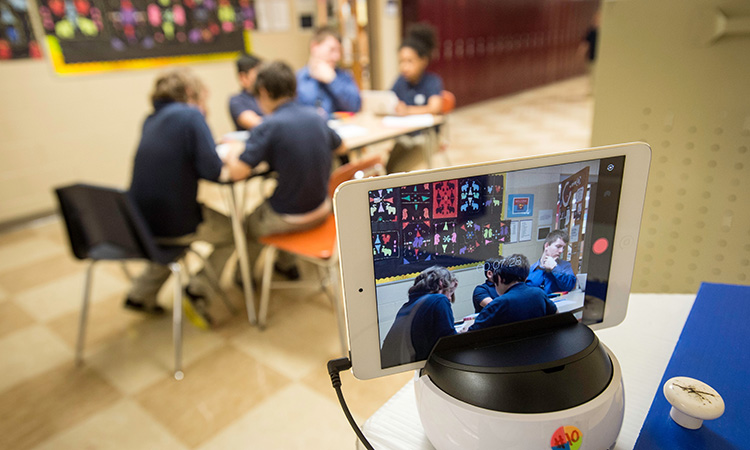Teach Today: Transform Tomorrow Elementary Education STEM program receives $262K grant

A state grant totaling more than a quarter of a million dollars will help position the University of Indianapolis to meet the growing demand for STEM teachers in elementary school classrooms.
The University of Indianapolis Teach Today: Transform Tomorrow Elementary Education STEM program was awarded $262,801 through the 2017 Indiana STEM Teacher Recruitment Fund Grant. The grant will provide the program additional funding to recruit and retain highly-qualified STEM elementary teachers in Indiana during the 2017-18 and 2018-19 academic years.
Nancy Steffel, director of the Universitys elementary education program and professor of teacher education, and Libby Turner, instructor, wrote the grant, which promotes 21st century skills with a STEM focus through the Teach Today: Transform Tomorrow program.
Teacher candidates will learn what they need to teach, how to teach it and why they need to teach it all at the same time instead of the traditional sequenced order of content, methods and field experiences, Steffel said. Students enrolled in the program will follow the K-6 calendar (August through May), with university content and methods courses aligned with field experiences to work together synergistically.
The grant focuses on recruitment of talented high school students who show an interest in STEM and teaching to work with them as early as the 10th grade to develop the mindset around becoming a teacher. Once on campus, the grant will support retention efforts of elementary education majors as they grow into professional teachers, said Colleen Mulholland, interim dean of the School of Education.
The program will allow the University to address Indianas need to increase the number of teachers for the STEM pipeline. Mulholland noted that STEM is a cornerstone component of the newly revised elementary education program, which is the result of a four-year interdepartmental collaboration.
Research highlighted in the US News & World Report (2011) shows interest in the natural sciences, engineering and problem-solving is evident from birth; yet one-third of boys and girls lose interest in STEM by fourth grade and by eighth grade 50 percent have lost interest and do not envision an academic future in the STEM areas, Mulholland said.
The Teach Today program uses a cross-curricular model suggested by the National Science Teachers Association and the New Generation Science Standards. Courses will be taught as STEM or education blocks with corresponding labs and field work that support the candidates learning.
That interdisciplinary approach has been crucial to the success of recent STEM initiatives at the University of Indianapolis, including the Universitys Teach (STEM)³ program funded through the National Science Foundation Robert Noyce Teacher Scholarship Program, which focuses on preparing secondary-level STEM educators. Although funded through separate grants, the two programs together represent the School of Educations commitment to meeting the need for STEM professionals and teachers at every level of K-12 through interdepartmental collaboration. Formerly the Woodrow Wilson Teaching Scholarship Program, Teach (STEM)³ has graduated more than 70 STEM teachers since 2008, many of whom stay and work in Indiana schools.
This award would not be possible without the collaborative efforts of faculty from three schools: the School of Education, Shaheen College of Arts & Sciences and the College of Applied Behavioral Sciences, Mulholland said.
Turner noted that program candidates not only will hear about integrating curriculum but observe it in a K-6 setting, experience the differing levels of integration in varied courses and disciplines and have the opportunity to create and implement levels of integration in lessons of their own.
We are designing such an integrated approach that it is exciting and invigorating but also pushing the confines and structures of traditional university calendars and systems, Turner said.
Candidates will graduate in three and a half years with more training in STEM, along with concentrations in reading and special education. Through the grant, inaugural candidates will receive a $1,000 stipend towards tuition and living expenses for their first year on the conditions that candidates complete the Elementary Education STEM programs first year with a 2.75 overall GPA, remain in the Universitys School of Education to earn their degree with a STEM teaching focus and teach in an Indiana elementary school for at least one year upon graduation.
The program also will network with CELL (Center of Excellence in Leadership of Learning), its partner institution at the University, and the STEM Teach program to reach out to teachers who can recommend potential teacher candidates. The program will join CELLs Early College High School network meetings to help reach first-generation, socioeconomically disadvantaged, and/or underrepresented population high school students.
The grant was made possible with the input of the Initial Elementary Education Redesign Team and several other contributors.
Initial Elementary Education Redesign Team:
John Somers, SOE
Gaoming Zhang, SOE
Kate Reinhardt, SOE
Libby Turner, SOE
Nancy Steffel, SOE
Bev Reitsma, SOE
Rachael Aming-Attai, SOE
Brooke Hooper, Graduate and University Supervisor
Sarah Weimer, Christel House Academy
Steve Spicklemire, SCAS
Other SOE contributors:
Deb Sachs
Terrence Harewood
Colleen Mulholland
Greta Pennell
Laura Hammans
College of Behavioral Applied Sciences:
Katie Boucher
Shaheen College of Arts & Sciences:
Travis Miller
Ann Cutler
Clay Roan
Larry Sondhaus
Emily Miller
Brenda Clark, Music
James Leagre, Theater
James Viewegh, Art
Jessica Bannon
Carrie Kilfoil
Administrators, faculty and community experts from:
MSD Decatur
Christel House Academy
Indianapolis Zoo
Indianapolis Childrens Museum
National Science Teachers Association
Engineers Playground
dLab at the University of Kentucky
